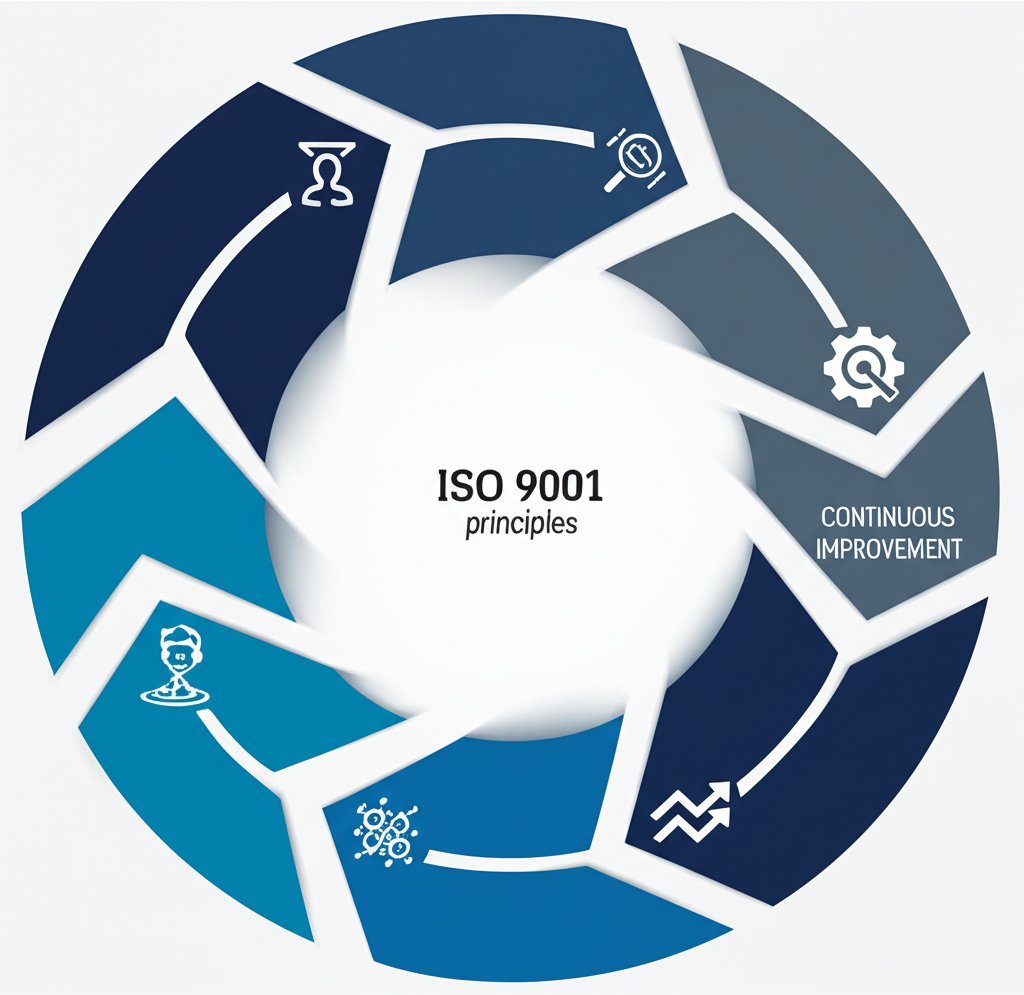Essential Benefits of an ISO 9001 Certified CNC Machine Shop

TL;DR
An ISO 9001 certified CNC machine shop operates under a globally recognized standard for a Quality Management System (QMS). This certification is not just a plaque on the wall; it signifies a deep commitment to process control, ensuring every part is produced with exceptional consistency and complete traceability. For customers, this translates to reduced risk, reliable quality, and a manufacturing partner you can trust for critical projects.
Understanding ISO 9001 Certification in CNC Machining
In the world of precision manufacturing, consistency and quality are paramount. The ISO 9001:2015 certification serves as the international benchmark for a company's Quality Management System (QMS). It's a formal declaration that a CNC machine shop has established, documented, and maintains a systematic approach to quality. This framework ensures that from the initial quote to final delivery, every process is managed to meet customer and regulatory requirements consistently.
The core of ISO 9001 is a process-driven methodology. As detailed in guides for machine shops, the standard is built on the Plan-Do-Check-Act (PDCA) cycle, which fosters continuous improvement. This means a certified shop doesn't just inspect finished parts (Quality Control); it proactively manages the entire production ecosystem to prevent defects from occurring in the first place (Quality Management). This involves rigorous documentation, employee training, equipment maintenance, and risk assessment to ensure predictable outcomes.
It's important to distinguish ISO 9001 from part-specific standards. While a standard like ISO 2768 defines general tolerances for machined parts, ISO 9001 governs the entire system that produces those parts. A certified shop maintains meticulous records, allowing for complete traceability—the ability to track a part's journey from raw material to finished product. According to one ISO-certified machine shop, this commitment means living an "audit lifestyle," where processes are so ingrained that the shop is always ready for scrutiny, ensuring accountability and consistent performance. This approach is crucial for high-stakes industries like aerospace, medical, and defense, which often mandate this level of process control.
To illustrate the difference, consider how certified and non-certified shops might approach a project:
| Aspect | ISO 9001 Certified Shop | Non-Certified Shop |
|---|---|---|
| Process Control | Follows documented, repeatable procedures for all tasks. | Processes may vary based on the machinist or day, leading to inconsistency. |
| Documentation & Traceability | Maintains comprehensive records of materials, machine settings, and inspections. | Record-keeping may be informal or incomplete, making it difficult to trace issues. |
| Risk Management | Proactively identifies and mitigates potential risks to quality and delivery. | Tends to react to problems after they occur, causing delays and rework. |
| Continuous Improvement | Systematically analyzes performance data to make ongoing improvements. | Improvements are often ad-hoc and not based on structured data analysis. |
The Core Benefits of Partnering with an ISO 9001 Certified Shop
Choosing an ISO 9001 certified CNC machine shop is a strategic decision that directly impacts the success of your project. The benefits extend far beyond a simple quality guarantee, offering tangible advantages in reliability, accountability, and overall value. For businesses in demanding sectors like aerospace, medical devices, and automotive, these benefits are not just helpful—they are often essential for compliance and market success.
The primary advantage is the assurance of consistent, high-quality parts. An ISO 9001 certified shop's adherence to documented processes eliminates guesswork and variability. Every component is manufactured under the same controlled conditions, time after time. This consistency reduces the likelihood of defects, minimizes the need for costly rework or returns, and ensures that the parts you receive will perform as expected in their final assembly. This reliability is the foundation of a stable and predictable supply chain.
Another critical benefit is complete traceability. In the event of a part failure or a product recall, a certified shop can trace the component's entire history—from the raw material batch to the specific machine and operator involved. This level of auditable record-keeping is invaluable for root cause analysis and corrective action, providing a crucial layer of accountability. It demonstrates a manufacturer's control over its processes and provides peace of mind that any issues can be quickly identified and resolved.
For companies focused on innovation, working with a certified partner can significantly de-risk the product development cycle. For instance, when you need to accelerate your product development with formative manufacturing services, a trusted partner with ISO 9001:2015 certified quality control is essential. This certification ensures that from initial concepts to functional testing, every prototype is produced with the same rigor as a full production run. Services like those offered by XTJ, which provide rapid turnaround and expert Design for Manufacturability (DFM) feedback, rely on this quality framework to deliver reliable results. Ultimately, this leads to a lower total cost of ownership by preventing errors, reducing waste, and avoiding expensive delays.
Key advantages include:
- Enhanced Quality and Consistency: Standardized processes ensure every part meets your exact specifications.
- Reduced Supply Chain Risk: Proactive risk management and process controls minimize the chance of delays or quality escapes.
- Complete Traceability: Auditable records provide full transparency and accountability for every component.
- Commitment to Continuous Improvement: The QMS drives ongoing enhancements to efficiency and quality, benefiting the customer.
- Access to Demanding Markets: Certification is often a prerequisite for supplying to industries like aerospace, medical, and defense.

How to Verify a Machine Shop's ISO 9001 Certification
Claiming to be ISO 9001 certified is easy; proving it requires documentation. As a customer, performing due diligence to verify a potential supplier's certification is a critical step in protecting your project and your investment. This process is straightforward and ensures that the quality system you're relying on is legitimate, current, and applicable to the services you require. Trust but verify is the best policy when it comes to manufacturing partners.
The first step is to request a copy of the shop's official ISO 9001 certificate. This document is more than just a piece of paper; it contains specific, verifiable information. Look for key details such as the company's full legal name and address, the scope of the certification (which should cover CNC machining or related manufacturing services), the certificate number, and, most importantly, the issue and expiration dates. An expired certificate is a major red flag, as it indicates a lapse in compliance.
Next, identify the certifying body, also known as the registrar, listed on the certificate. This is the third-party organization that conducted the audit and issued the certification. Reputable registrars are accredited by a national accreditation body. For example, in the UK, this is the United Kingdom Accreditation Service (UKAS), which offers a tool called CertCheck to verify certificates. Similar databases and verification methods exist for registrars worldwide. You can typically visit the registrar's website and use their online directory to search for the machine shop's name or certificate number to confirm its validity.
Follow these steps to ensure a shop's certification is authentic:
- Request the Certificate: Ask the machine shop for a PDF copy of their current ISO 9001:2015 certificate.
- Examine Key Details: Check that the company name, address, and scope of certification match your needs. Pay close attention to the expiration date.
- Identify the Registrar: Note the name of the third-party certifying body that issued the certificate.
- Verify with the Registrar: Visit the registrar's official website and use their online validation tool or directory to confirm the certificate's status. If a tool isn't available, you can often contact the registrar directly.
- Ask About Their QMS: Inquire about their quality process. A truly committed shop will be happy to discuss their QMS, how they handle non-conformances, and their commitment to continuous improvement.
Taking these simple verification steps provides assurance that you are partnering with a company that has a genuine and active commitment to the quality standards that your projects demand.
Your Partner in Precision and Quality
Choosing a manufacturing partner is a critical decision that impacts your product's quality, timeline, and budget. An ISO 9001 certified CNC machine shop offers more than just parts; it provides a proven framework for reliability and excellence. By prioritizing documented processes, complete traceability, and continuous improvement, these shops mitigate risk and deliver a level of consistency that is essential for today's competitive landscape. Verifying this certification is a simple but vital step to ensure you are working with a supplier truly dedicated to the highest standards of quality management.

Frequently Asked Questions
1. What is the ISO standard for CNC machines?
While there isn't one single ISO standard for CNC machines themselves, ISO 9001:2015 is the key standard for the quality management system of the shop that operates them. For physical parts, standards like ISO 2768 are often used to define general dimensional and geometric tolerances. However, ISO 9001 is broader, ensuring the entire process from quoting to shipping is controlled and repeatable.
2. How can I check if a company is ISO 9001 certified?
The most reliable way is to ask the company for a copy of their certificate. Then, identify the certifying body (registrar) on the document and visit their website to use their online verification tool. National accreditation bodies, like UKAS in the United Kingdom, also offer public databases to check the validity of certificates from accredited registrars.
3. Is ISO 9001 certification required for all machine shops?
No, it is not a legal requirement for all machine shops. However, it is often a customer requirement, especially for companies in regulated industries like aerospace, medical, defense, and automotive. Many Original Equipment Manufacturers (OEMs) will only work with ISO 9001 certified suppliers to ensure the stability and quality of their supply chain.
-
Posted in
Certified Machine Shop, cnc machining, ISO 9001, precision manufacturing, quality management





